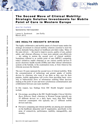
The highly collaborative and mobile nature of clinical teams makes the strategic investment in clinical mobility solutions essential to meet the intense demands being placed on healthcare providers today. Many of the same drivers - the need to improve access, quality of care, patient safety, and clinician efficiency to treat more patients cost-effectively - are setting in motion the second wave of clinical mobility. Sometimes referred to as mobile point of care (MPOC) computing, today's initiatives enable clinicians to use various mobile devices to access electronic health records (EHRs) and other clinical information systems at the bedside, in the examination room, or from wherever the clinician accesses the Internet.
The next 10 years represent the second wave of clinical mobility. With the consumerization of technology and greater uptake of mobile devices by clinicians who want to use them as they care for their patients, mobile applications will evolve from providing basic views only to bidirectional flows of information enabling better decision making at the point of care and more synchronous communication and collaboration between care team members.
Download from eHealthNews.eu Portal's mirror: The Second Wave of Clinical Mobility: Strategic Solution Investments for Mobile Point of Care in Western Europe (.pdf, 801 KB).
About IDC Health Insights
IDC Health Insights provides research-based advisory and consulting services that enable healthcare and life science executives to:
IDC Health Insights provides full coverage of the health industry value chain and closely follows the payer, provider, and life science segments. Its particular focus is on developing and employing strategies that leverage IT investments to maximize organizational performance. Staffed by senior analysts with significant technology experience in the healthcare industry, IDC Health Insights provides a portfolio of offerings that are relevant to both IT and business needs.